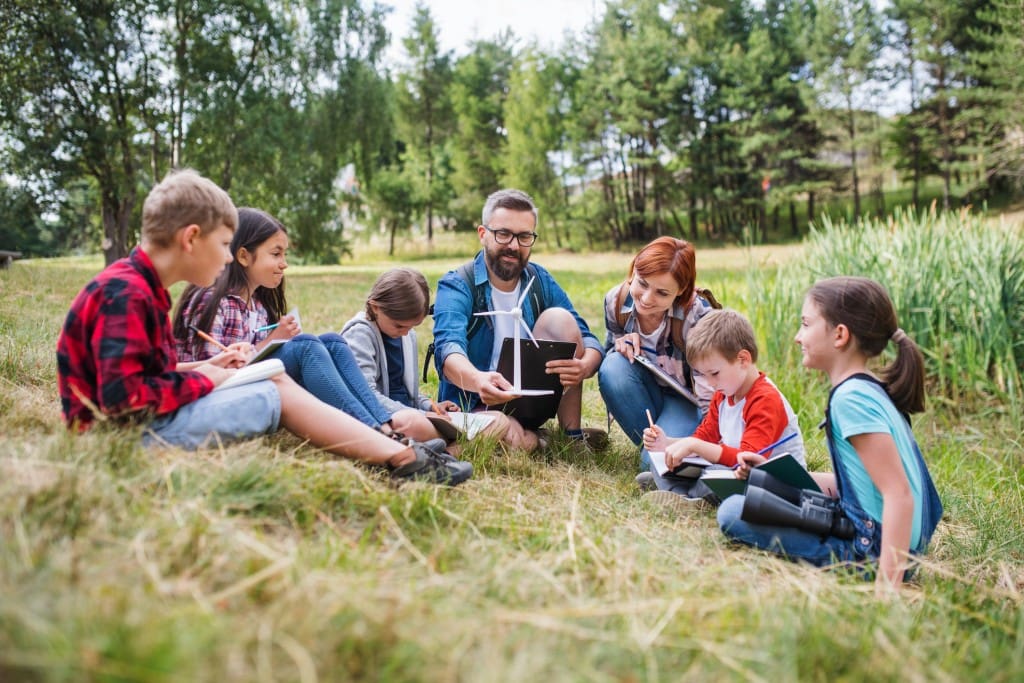The coronavirus pandemic is changing how millions of children around the globe will be educated this fall. New solutions for teaching youth could bring much-needed innovation and better learning models. And many families are seeking out new-to-them alternatives to public schooling. Both parents and educators are still learning how to educate our children in this unprecedented time most effectively.
For some families, distance learning is not an option.
As a former school teacher and district administrator, I understand how a real digital divide exists among families that can afford computers, internet Wi-Fi, and smartphones and those that cannot. Many lower-income families do not have access to computers or internet connections. Thus, their children are unable to engage in virtual and distance learning. These new shifts in education could either close or widen inequality gaps.
For dual-income families, learning at home has challenges.
For parents like my husband and myself who work and share the duties of raising our kids together, the effects of COVID-19 have meant adapting quickly within our family to a steep learning curve. One that sometimes changes weekly! We have been fortunate to hire a nanny who assists us part-time on weekdays. Plus, our kids are little, so we aren’t concerned with the pressures of high-level curriculum, college admissions processes, or impending graduation dates.
For many single and low-income families, there are very few good options.
For single parents, parents of high-school-age children, and parents in low-income communities, finding a balance can be overwhelming. These parents juggle educating their children, paying for daycare options, and sorting through their kids’ curriculum, on top of working and earning money. For them, it has been a tumultuous process.
I try to keep all of this in mind as I consider the different learning scenarios that families are facing around the country this fall. What will be the best alternatives to traditional public schooling? Truthfully, this will vary from family to family and child to child.
7 Alternatives to Traditional Public Schooling
The big lingering question mark then, is will public schools be open or not? Depending on where you live, you may find yourself in a position where public schooling is not an option. If you’re a parent searching for options other than public school education, the following suggestions may be a valuable starting place for you and your family. Remember, you are not alone. Many parents are facing the same uncertainty you feel. Good things can and will emerge out of this experience!
1. Homeschool
If you’re a parent feeling inspired and willing to take on the task of educating your children at home, there are many online resources available to support you in this endeavor. The National Homeschool Association, in addition to Homeschool.com, both offer an array of choices for how to structure your child’s homeschool curriculum and activities at home. Further, these websites provide ways to connect with other homeschooling parents. You can also utilize Facebook and social media to find groups of homeschool families in your area. Type in your town’s name and the word “homeschool” to find specific groups in your hometown or state. This has become a more popular alternative to public schooling.
2. PODS (Parent Organized Discovery Sites)
PODS are teaching groups that are a part of the National Homeschool Association. They are a good option for parents who want to share the responsibility of teaching their children with other families. This is also a good option for single parents or working parents who want their kids to be homeschooled but don’t necessarily have the capacity to be teaching full-time.
PODS groups are typically groups of 7 to 14 families. They come together with the understanding that each family will invite all of the children of the group to come to their home one day out of each week (or every other week if there are enough families in the group). The host parent is responsible for care for all of the children, learning assistance, and sometimes provides the lunchtime meal, too, unless students bring their own food from home. For more information on PODS groups near you, click here.
3. Learning Co-operatives
Learning cooperatives or “co-ops” and “micro-pod” learning is a concept where a couple of families hire a teacher to educate their children. Sometimes, the teacher is simply one of the parents, or multiple parents switching off each day. Other times, cooperative or pod schooling groups hire a certified, experienced teacher (who may be otherwise out of work with schools being closed). Parents act as assistants by opening their homes as classrooms, paying for a rental space to be used as a classroom, and/or providing hands-on assistance to the main teacher during classroom hours.
Cooperatives can look different depending on how they are organized. But essentially, they consist of parents and hired teachers working together to educate their children. For example, the Homeschool Coop 2020 just emerged as a group of parents, professors, and enthusiasts working to offer online classes for kids of all ages and can be used to supplement any in-person cooperatives.
4. Micro Schools
Micro Schools are similar to learning cooperatives, but they typically meet outside the home in a designated “school space.” This could be a one-room school (think Laura Ingalls Wilder style) or a rented classroom or office space for innovative teaching purposes. These schools are essentially miniature private schools with as few as six students and up to 25 or more. They are unique in that they can offer parents a highly specialized private school experience for their child at a fraction of the cost of a conventional, larger private school. If you’d like to find or start a micro-school in your area, check out the micro-school coalition.
5. Private School
Some private schools will be open this fall because their decision to stay open or closed can fall outside the jurisdiction of public school districts. The policies deciding whether or not a private school will be open varies from state to state. To find a private school that suits your child’s needs, try the National Association of Independent Schools (NAIS) or K12Academics.com. K12 Academics provides a veritable list of private schools, including all girls, boys, alternative schools, religious schools, community schools, Montessori programs, Waldorf schools, deaf schools, schools for the blind, and more.
6. Outdoor Education
Outdoor education has always been an excellent choice for alternative learning. It focuses on building character, teaching through relational and hands-on models, and social-emotional growth. A school approach that differs from your child’s traditional setting may be just right during these uncertain times. These are also great programs for children who are innate nature-lovers or environmentalists. But any type of learner can benefit from outdoor education.
Kroka Expeditions is still running most of its programs with new regulations and sanitization protocols in place according to state guidelines. This New Hampshire-based school and farm offers wilderness expeditions and learning programs in various locations across the U.S. with trips outside the U.S., as well. Outward Bound has 11 chartered schools across the country and offers over 1,000 courses for every age or circumstance, some of which may be limited due to COVID-19. Their expeditions and programs are both inside urban and suburban classrooms and outdoors in various natural settings. They even offer a program specific to grieving teens.
7. Tutoring with Supplemental Activities
With COVID-19 school shutdowns this past spring, some families found the greatest success by hiring a tutor to direct their child’s learning one-on-one. This fall, some families are continuing with a personal tutor for their children. Other families are banding together with another family to hire and share a tutor. These families may also supplement their children’s social-emotional learning through outside activities with other local students.
These families are typically following the public school curriculum. But the model can be applied to alternative curriculums as long as the tutor is comfortable teaching that material. This model requires financial resources for paying a tutor. The best way to find and hire a tutor for your child is to search online for local companies or post a listing on social media or a job market site.
While your child’s education may look different than the traditional public schooling, he or she is accustomed to, that doesn’t mean it will be less impactful. In fact, you may find that you and your child end up preferring one of these alternatives to public schooling! Whichever route you decide to take, understand that you and your kiddo will be just fine in the long run, no matter what happens this year. You can do this!































